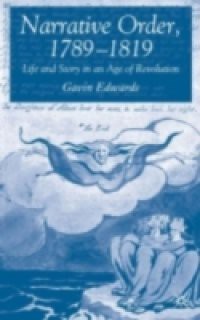Narrative Order 1789-1819: Life and Story in an Age of Revolution offers a new way of looking at the cultural transformations precipitated in Britain by the French revolution and its global repercussions. Drawing on twentieth-century ideas about the relationship between life and story, Gavin Edwards argues that the experience of social dislocation, both at home and overseas, led British writers' to doubt that life could be represented as a narrative, an unbroken temporal sequence with a beginning and an ending. Moreover, scepticism about narrative itself was associated with scepticism about other practises-such as the making of contracts and promises-which aim to give people's lives the shape of a story.Narrative Order throws new light on familiar literary and intellectual relationships (between Burke and Wordsworth, between Godwin, Wollstonecraft and Mary Shelley), reveals previously unnoticed connections (for instance between Scott and Keats), and brings into focus the work of writers such as George Crabbe and Watkin Tench whose importance in their own time has been obscured.

